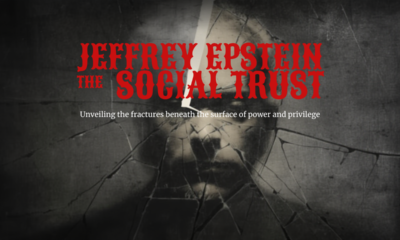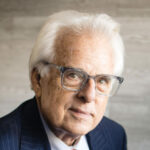Education
Universities Should Promote Rigorous Discourse, Not Stifle It
Professors at two elite universities have each called for censorship of their colleagues, a dangerous precedent.

The New England Journal of Medicine recently published an advocacy article that attacks academic freedom and urges stifling contentious campus debates. Specifically, Evan Mullen, Eric J. Topol, and Abraham Verghese urge universities to “speak out publicly” and issue official institutional opinions about public controversies involving its professors “when it concludes that a faculty member’s opinion could cause public harm.”
The Scott Atlas case
The NEJM authors write in the context of Stanford University refusing to institutionally condemn the arguments made by one of its scholars, Dr. Scott Atlas, when he advised the Trump administration on COVID policies in the early days of the pandemic. The authors, one of whom is a physician trainee (Mullen) and another the former vice chair of education (Verghese) at Stanford, are university colleagues of Atlas, as is one of the authors of this essay (Bhattacharya). They claim that Atlas’ publicly expressed skepticism of masking as an effective prophylactic against infection and his belief that lockdowns and school closures would cause more harm than good were so potentially harmful that Stanford itself – as an institution – should have condemned Atlas’ opinions.
Why? It wasn’t as if some of his colleagues didn’t criticize Atlas. Indeed, more than a hundred Stanford professors and physicians wrote publicly opposing his advice. The letter’s signatories also pushed a vote through the Stanford Faculty Senate in November 2020 condemning Dr. Atlas, using quasi-religious language to declare his positions “anathema.” But that wasn’t enough, apparently, because “institutional silence may be interpreted as tacit approval.”
Universities always see controversy in their science departments
Controversy between professors is the norm at the frontiers of science. It is utterly unsurprising that there would be discord over the proper policy to follow in the wake of a pandemic featuring a new virus, with great uncertainty about its epidemiological and biological aspects. In the intervening years, Dr. Atlas’ positions in 2020 on school closures and mask mandates have been proven legitimate, demonstrating the wisdom of Stanford not taking a position as an institution.
Meanwhile, in another attack on academic freedom, Harvard’s Dean of Social Science issued a call in the Daily Crimson to punish professors who criticize the university, “A faculty member’s right to free speech does not amount to a blank check to engage in behaviors that plainly incite external actors,” wrote Lawrence D. Bobo, “be it the media, alumni, donors, federal agencies, or the government to intervene in Harvard’s affairs.” In other words, what happens at Harvard should stay at Harvard.
We believe these efforts to stifle heterodox thinking are not only wrong from an academic freedom perspective but harmful to the open and even raucous discourse required for the healthy functioning of a democratic society.
How would universities determine official or unofficial opinions?
First, there is the problem of how the institutional “official” opinions would be determined. The NEJM authors suggest establishing a large committee made up of members with a wide array of expertise and the ability to obtain outside opinions as circumstances warrant.
But such committees would quickly turn into ideologically stacked decks, particularly given the overwhelming progressive political dominance among professors and administrators in most major universities. After all, who would decide those selected to be committee members – and perhaps even more importantly, decide who should excluded? Why, the same administrators and faculty department chairs who have crafted the kind of sclerotic homogeneity that typifies contemporary university faculties.
The proposal calls to mind an earlier incident in scientific history. In response to Albert Einstein’s special theory of relativity, in 1931, a hundred German professors wrote a book attacking his idea. Einstein’s famous response? If his theory was wrong, it would not take the word of 100 scientists but rather just one fact. Scientific disputes and academic disagreements are properly handled in this way, not by institutional authority but by reason, data, and experimentation. The freedom to speak and disagree is essential to science.
It is wrong to stifle heterodox opinions
Second, if universities took “official positions” on matters of public controversy and on-campus debate, it would stifle the expression of unpopular or heterodox opinions by faculty that disagreed with officially sanctioned opinions and materially chill the free and open exchange of ideas required for academic freedom to thrive. Even tenured faculty with job security would be reluctant to disagree with the university’s institutional position openly. After all, a university can punish a professor in many ways besides losing a position. These include restricting lab time, making professors teach undesired classes, social shunning, and other means to create a hostile work environment. And what chance would there be for untenured faculty or adjunct professors with little job security to contest the university’s institutional opinion? Slim and none.
As for the Daily Crimson piece, if professors can be subject to professional discipline for publicly criticizing their institutions – say, by alerting alumni to the problem of campus antisemitism – then universities will become more insular than they already are. Talk about a formula to allow serious institutional problems to fester and become existential crises! Besides, why should university leadership be able to punish their on-campus critics? The only thing accomplished would be to isolate them from institutional and public accountability.
Refusing accountability?
That officials at both Stanford and Harvard have publicly advocated unwarranted restrictions in academic discourse points to the distressing possibility that the leadership of our elite universities desires to operate under an opaque shield of unaccountability. That’s the absolute wrong approach to achieving scholastic and scientific excellence, which requires transparency and the freedom to express ideas that may be unpopular today but could well prove true tomorrow.
This article was originally published by RealClearPolitics and made available via RealClearWire.
-

 Civilization5 days ago
Civilization5 days agoWhy Europe Shouldn’t Be Upset at Trump’s Venezuelan Actions
-

 Christianity Today5 days ago
Christianity Today5 days agoSurprising Revival: Gen Z Men & Highly Educated Lead Return to Religion
-

 Civilization2 days ago
Civilization2 days agoTariffs, the Supreme Court, and the Andrew Jackson Gambit
-

 Civilization3 days ago
Civilization3 days agoWhy Europe’s Institutional Status Quo is Now a Security Risk
-

 Civilization4 days ago
Civilization4 days agoDeporting Censorship: US Targets UK Government Ally Over Free Speech
-

 Executive3 days ago
Executive3 days agoWaste of the Day: Wire Fraud, Conflicts of Interest in Connecticut
-

 Civilization3 days ago
Civilization3 days agoEpstein and the destruction of trust
-

 Education4 days ago
Education4 days agoWaste of the Day: Throwback Thursday – The Story of Robosquirrel











